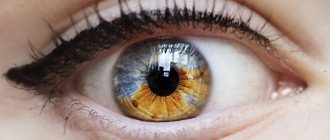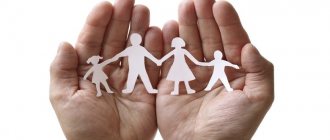Stress is a nonspecific (abnormal) state or reaction of the body to various unfavorable factors (stressors) affecting it. Small stressful situations are necessary for a person, because... they play an important role in further favorable changes in the life of the person himself. This is due to the release of adrenaline into a person’s blood during a stressful situation, as well as other biochemical reactions that help a person solve a particular problem. In addition to its positive effects, stress can also contribute to negative consequences. When a person is constantly exposed to stressful situations, his body intensively wastes its strength (energy), which leads to its rapid exhaustion. Since all organs are in a tense state, they are more susceptible to secondary adverse factors, for example, diseases. Thus, scientists have established two main types of stress - eustress (positive stress) and distress (negative stress) .
Causes of stress
There are a great many causes of stress, because... Each person has his own individual body, psyche, way of life, therefore, the same factor may not affect one person at all, or have an insignificant effect, while another person literally gets sick, for example, a conflict with another person. The most popular causes and/or stress factors:
- a conflict situation with another person - at work, at home, with friends or even with strangers, a quarrel;
- dissatisfaction with one’s appearance, the people around him, success at work, self-realization in the world, the environment (home, work), standard of living;
- low cost of living, lack of money, debts;
- long-term absence of vacation and proper rest from everyday activities and everyday life;
- routine life with the absence or small amount of positive emotions and changes;
- long-term chronic diseases, especially those affecting appearance, as well as illnesses of relatives;
- overweight;
- death of a relative or simply a close or acquaintance;
- lack of vitamins and microelements in the body;
- watching emotional films, or vice versa, horror films;
- problems in sexual life;
- frequent fears, especially of fatal diseases (cancer), the opinions of others, old age, a small pension;
- loneliness;
- excessive physical activity, or unfavorable environmental conditions (cold, heat, rainy weather, high or low atmospheric pressure);
- a sudden change in the environment - moving to another place of residence, changing jobs;
- hard music;
- other reasons or situations that can hook or irritate a person.
Symptoms of stress
Among the most popular reactions of the body to stress are:
- causeless and frequent attacks of irritability, anger, dissatisfaction with the people around a person, the situation, the world;
- lethargy, weakness, depression, passive attitude and unwillingness to communicate with people, even with family and friends, fatigue, reluctance to do anything;
- insomnia, restless sleep;
- inability to relax, constant tension in the nervous system and physical body;
- attacks of fear, panic;
- poor concentration, lethargy, difficulty understanding ordinary things, decreased intellectual capabilities, memory problems, stuttering;
- distrust of oneself and others, fussiness;
- frequent desire to cry and sobbing, melancholy, self-pity;
- lack of desire to eat food, or, conversely, excessive desire to eat;
- nervous tics, non-specific desires for the patient to bite one’s nails or bite one’s lips;
- increased sweating, increased excitability, digestive system disorders (diarrhea, nausea, vomiting), itching, headache, dizziness, rapid heartbeat, chest discomfort, breathing problems, feelings of suffocation, sudden increase in body temperature, chills, numbness or tingling in the limbs;
- - increased interest in alcohol, drugs, smoking, computer games and other things that previously did not interest the person.
Phases of stress
The development of stress occurs in three phases:
- Mobilization. The body reacts to a stressor with anxiety and mobilizes its defenses and resources to withstand the stress factor.
- Confrontation. The body resists a stressful situation, the person actively seeks a way out of it.
- Exhaustion. With a long duration of influence of a stress factor on a person, the body begins to deplete and becomes vulnerable to secondary threats (various diseases).
Principles of stress treatment
Treatment of stress includes the following points: removal of the stressor (stress factor); physiological procedures; taking sedatives; psychological correction.
Stress Prevention
To minimize the development of stress, you should pay attention to the following recommendations:
- to live an active lifestyle;
- eat food enriched with vitamins;
- try to find a job you like;
- get enough sleep;
- give up alcoholic beverages and do not use drugs;
- spend more time outdoors, relax in nature;
- limit yourself in caffeine consumption (coffee, strong black tea);
- do not watch or listen to things that cause trouble (movies, music, news);
- monitor your child - what he reads and watches, limit him from information of a violent, otherworldly and occult nature;
- share your experiences with trusted friends or relatives;
It is important to remember: if you feel that it is impossible to overcome stressful situations, you should seek advice from a specialist psychologist, or a neurologist or psychotherapist.
Causes of stress
An important and one of the most striking features of stress is that appropriate responses appear not only to negative, but also to positive stress factors, because they also serve as harbingers of change. You don’t need to look far for an example – just remember pregnancy.
Let's say a woman is expecting a child. On the one hand, this is one of the best moments of her life, because she really wanted a baby and from the feeling that she will soon give birth to a new person, she experiences unprecedented pleasure, joy and happiness. On the other hand, changes begin to occur in her body. Yes, they are temporary, but they still cause discomfort and some troubles.
In the first months, a pregnant woman experiences pronounced toxicosis, which indicates the body’s struggle with a stressful situation. The immune system is suppressed, which allows the body not to reject the foreign element - the ripening fetus of the child. Various immune reactions, hormonal changes and other processes accompanying pregnancy are all extremely stressful.
During the final stages of pregnancy, health problems often become even worse, and as a result, an initially positive event can transform into postpartum depression, which will require serious and immediate professional intervention. We have described only a special case, which shows that it is imperative to keep in mind that stress can also be caused by joyful events in life.
But the main causes of distress are negative events and situations that occur in a person’s daily life. Agree that each of us has our own system of values and beliefs, has our own degree of receptivity, but it’s probably impossible to find people indifferent to life’s shocks.
Therefore, when mastering the topic of stress and being interested in developing stress resistance, you should pay attention to your reactions to unfavorable circumstances and events. In changing them lies the whole secret of creating psychological “immunity” to stress. But let's continue the conversation. The next question that interests us is signs of stress.
Treatment of stress
According to psychologists, stress can be treated even at home. This is especially true for those who adequately perceive their condition, understand that they have problems, and are ready to begin to resist negative changes.
The first thing that requires attention is the emotional sphere - it is necessary to gradually reduce the level of anxiety and begin to calm down. To do this, it is recommended to drink soothing infusions, infusions and teas, take sedatives, and undergo massage sessions. But the most important thing is to eliminate the stress factor, otherwise there will be no result at all, or you will have to wait a very long time for it.
Experts advise starting the recovery period as early as possible - this will not allow stress to intensify, which means that treatment will give results faster. And in order for the body and psyche to fully recover and withstand new stress in the future, it is necessary to take measures to strengthen overall health.
The state of health directly depends on a person’s lifestyle: whether he sleeps enough, whether he eats normally and regularly, whether he observes a work and rest schedule and moderation in physical and mental activity, whether he takes vitamins, and whether he takes measures to replenish the nutrients consumed by the body. All this is very important, because if the body is exhausted, it is simply not able to function fully and effectively.
There are many other methods of prevention, stress suppression and development of stress resistance that can be successfully used in everyday life and which are often recommended by psychologists. These include positive thinking, switching attention, playing sports, traveling and others.
We hasten to remind you that we talked about some interesting and very effective techniques in the articles “Stress resistance. How to stay calm and productive" and "Preventing stress and developing stress resistance." So if you are seriously interested in this topic, be sure to read them.
And in conclusion, we would like to say that if self-treatment of stress does not produce any results, if you do not notice any positive dynamics, this should be an alarm bell for you and a signal to seek qualified help. The same applies to people whose health and life you care about.
In general, today you have a serious advantage, because your knowledge about stress has expanded and become much deeper. Life wisdom, which says that to defeat the enemy you need to know him in person, comes in handy here. Understanding how stress works, knowing its close relationship with the psyche and physiology, you can always determine in time whether you should worry about anything.
But in any case, we advise you to read our other articles on the topic of stress. Believe me, this is not a waste of time at all. Life sometimes presents very unexpected surprises, and this happens at the most inopportune moments. Therefore, there is no guarantee that tomorrow something will not happen that could easily deprive us of our balance.
Think about the future more often and work on yourself. We wish you as few obstacles as possible, and when they appear, the desire, strength and ability to overcome them!
We also recommend reading:
- Storytelling
- Stress Diary
- Stress: is there any benefit from it and how to get it?
- Ways to relieve stress
- How to cope with stress
- Questions to ask yourself to relieve stress
- Impact of stress on quality of life
- Four types of stress
- Surprising facts about stress
- Coping strategies as a way to deal with stress
- Cumulative stress theory
Key words:1Psychoregulation










